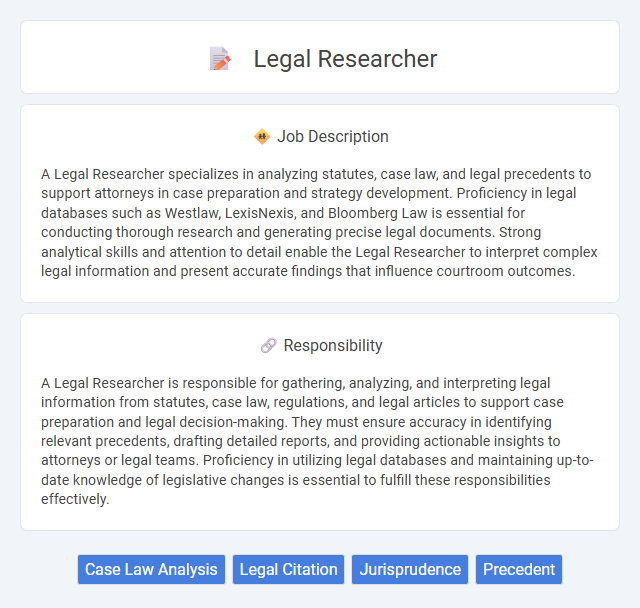
A Legal Researcher specializes in analyzing statutes, case law, and legal precedents to support attorneys in case preparation and strategy development. Proficiency in legal databases such as Westlaw, LexisNexis, and Bloomberg Law is essential for conducting thorough research and generating precise legal documents. Strong analytical skills and attention to detail enable the Legal Researcher to interpret complex legal information and present accurate findings that influence courtroom outcomes.
Individuals with strong analytical skills and attention to detail are likely well-suited for a Legal Researcher position, as the role requires thorough examination of legal documents and case law. Those who prefer independent work and can manage extensive information efficiently may find this job fulfilling. Conversely, people who struggle with prolonged concentration or complex material might find the responsibilities challenging and less suitable for their capabilities.
Qualification
A Legal Researcher must possess a strong understanding of legal principles, typically demonstrated through a law degree (JD or LLB) or a related qualification. Proficiency in analyzing statutes, case law, and legal precedents is essential for producing accurate and reliable research. Advanced skills in legal databases such as Westlaw, LexisNexis, and strong analytical and writing abilities are critical for success in this role.
Responsibility
A Legal Researcher is responsible for gathering, analyzing, and interpreting legal information from statutes, case law, regulations, and legal articles to support case preparation and legal decision-making. They must ensure accuracy in identifying relevant precedents, drafting detailed reports, and providing actionable insights to attorneys or legal teams. Proficiency in utilizing legal databases and maintaining up-to-date knowledge of legislative changes is essential to fulfill these responsibilities effectively.
Benefit
Legal researcher roles likely offer significant benefits such as enhancing critical thinking and analytical skills through in-depth case law and statute analysis. There is a strong probability that working as a legal researcher provides exposure to diverse legal issues, improving expertise and career advancement opportunities. Access to a network of legal professionals and potential involvement in high-stakes litigation or policy development may also contribute positively to career growth.
Challenge
Legal researcher roles probably involve navigating complex legal frameworks and continuously updating knowledge to keep pace with evolving laws and regulations. The challenge often lies in accurately interpreting vast amounts of legal information while maintaining precision and relevance. Effective problem-solving skills may be crucial to address ambiguities and provide reliable support for legal decision-making.
Career Advancement
Legal researchers play a crucial role in supporting law firms and corporate legal departments by analyzing statutes, case law, and legal precedents to provide actionable insights. Career advancement opportunities include progressing to senior legal researcher positions, specializing in niche legal areas, or transitioning into roles such as legal analyst, compliance officer, or litigation consultant. Developing expertise in emerging fields like intellectual property or data privacy law significantly enhances prospects for leadership roles and higher remuneration.
Key Terms
Case Law Analysis
Legal researchers specializing in case law analysis scrutinize judicial opinions and precedents to support litigation strategies and legal arguments. Their expertise involves identifying relevant case rulings, interpreting judicial reasoning, and synthesizing findings to inform legal memoranda and briefs. Proficiency in legal databases such as Westlaw, LexisNexis, and Bloomberg Law is essential for efficient case law retrieval and advanced legal research.
Legal Citation
Legal researchers specializing in legal citation meticulously analyze case law, statutes, and regulations to ensure precise referencing in legal documents. Mastery of Bluebook, ALWD, or regional citation manuals is essential for maintaining accuracy and credibility. Their expertise supports attorneys in drafting briefs, memoranda, and pleadings with authoritative and standardized citations.
Jurisprudence
A Legal Researcher specializing in Jurisprudence analyzes court decisions, legal theories, and statutory interpretations to support case strategies and academic work. Expertise in comparative law, constitutional principles, and judicial precedents enhances the ability to provide comprehensive legal analyses and draft persuasive arguments. Proficiency in legal databases such as Westlaw, LexisNexis, and HeinOnline ensures access to up-to-date case law and scholarly articles essential for in-depth jurisprudential research.
Precedent
Legal researchers specializing in precedent analyze past judicial decisions to guide current case strategies and predict court outcomes. They meticulously examine case law, statutes, and legal opinions to identify relevant authorities that establish binding or persuasive precedents. Their expertise ensures accurate interpretation and application of precedent, influencing legal arguments and supporting effective litigation or policy development.
 kuljobs.com
kuljobs.com